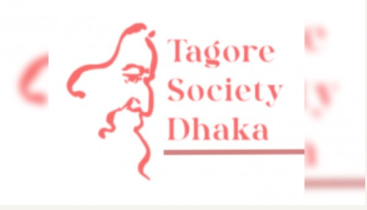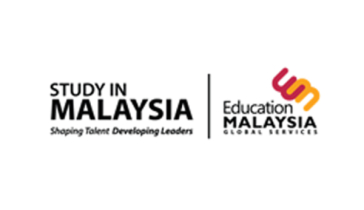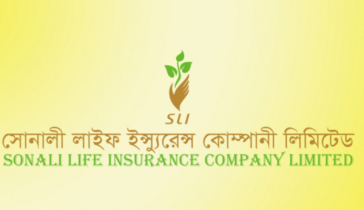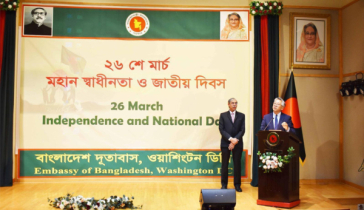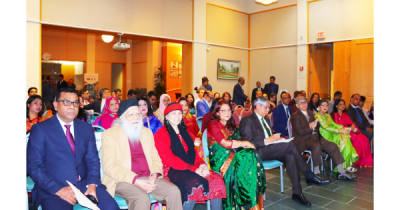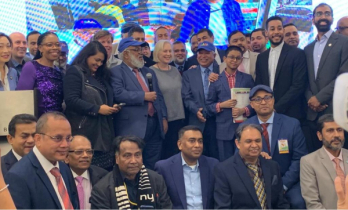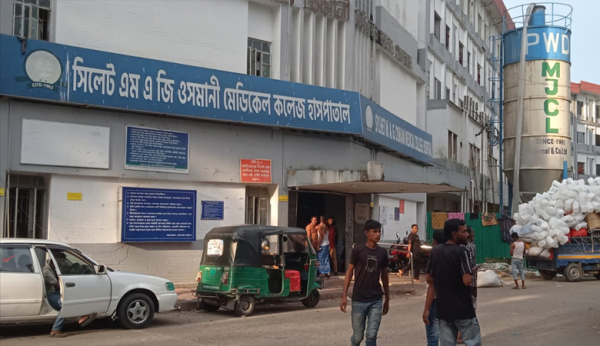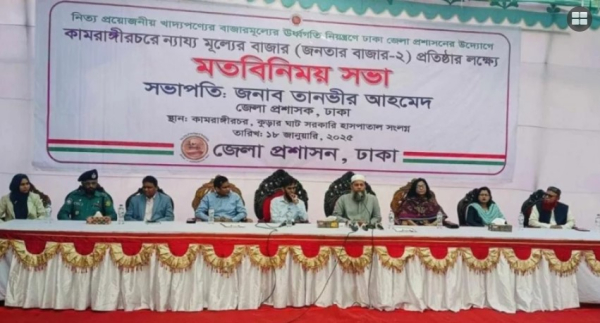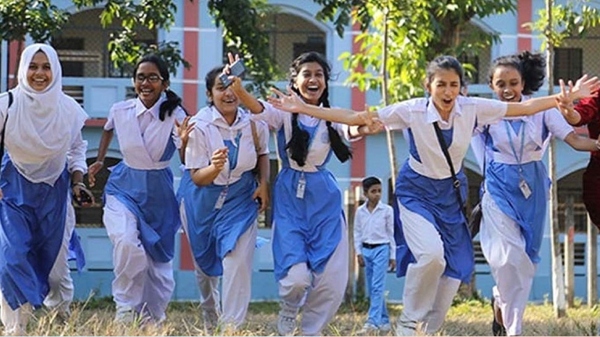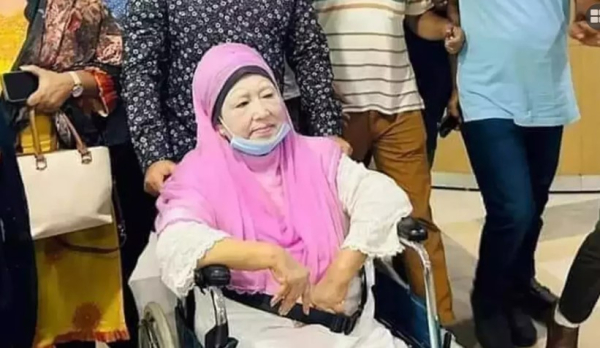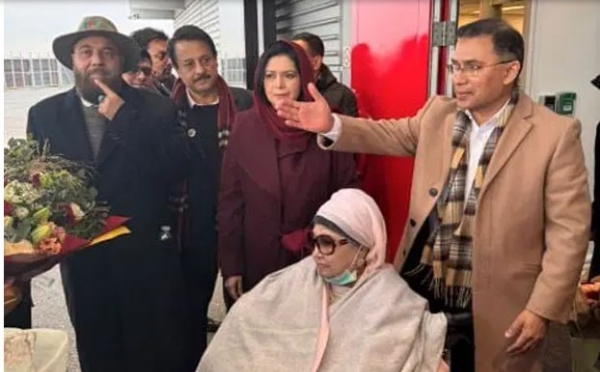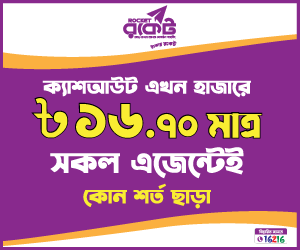Intl Girls in ICT Day
Virtual roundtable on Accelerating Digital Inclusion for Girls held
Intl Girls in ICT Day
Virtual roundtable on Accelerating Digital Inclusion for Girls held
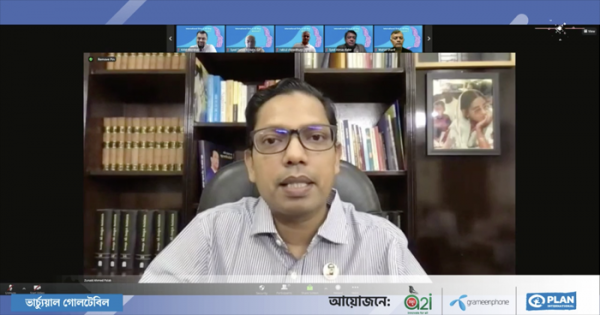 |
To increase skill and capacity of girls and young women in the sector of information, communication and technology (ICT) it is crucial to incorporate subjects like science, technology, engineering, mathematics etc in the national curriculum of primary education as well as ensure a job-oriented education system keeping the opportunities and demand of future job sector, said honourable State Minister, Zunaid Ahmed Palak, MP.
State Minister of Information Communication Technology Division, GoB said this in his remarks while addressing the virtual round table discussion on ‘Accelerating Digital Inclusion for Girls and Women’ as the chief guest.
On the occasion of the International Girls in ICT Day 2021, Aspire to Innovate (a2i), Grameenphone and Plan International Bangladesh jointly organized the roundtable discussion to explore the reality, gaps and scope for girls and young women to be active in the ICT sector for achieving an inclusive Digital Bangladesh. Every year on 4th Thursday of April, the International Girls in ICT Day is observed globally with an aim to inspire girls in technology to promote opportunities for girls and women in this field.
The state minister said, in today’s ICT sector, the need for learning programming and coding is increasing. ICT needs to be given focus in primary education to make girls and young women successful in this sector. The Government has taken initiative to incorporate programming and coding as subjects in primary education from the next education year.
“35 thousand modern digital labs are going to be established all over the country which will encourage and give more access to girls and young women in ICT.”
- Zunaid Ahmed Palak
He also urged the need of collaborative effort in mentoring and monitoring from the Government, non-government and private sector to ensure digital inclusion of girls and young women. He said, the Government of Bangladesh is working to grow women leadership in ICT alongside providing training and financial support.
Ms. Tusabber Muntaha, Youth representative, Assaduzzaman Asad, Youth representative, Tina F Jabeen, CEO and Managing Director, Startup Bangladesh, Mr. Syed Almas Kabir, President, BASIS, Mr. Wahid Sharif, President, BACCO and Mr. K A M Morshed, Senior Director, BRAC took part as panelists in the discussion moderated by Dr. Lafifa Jamal, Professor of Department of Robotics & Mechatronics Engineering. Mr. Syed Tanvir Husain, Chief Human Resources Officer of Grameenphone and Orla Murphy, Country Director of Plan International Bangladesh spoke as special guests.
Youth representative from Centre for Services and Information Disability-CSID, Innovation to Inclusion-i2i project, Tusabber Muntaha said, “The Government has taken a number of initiatives for people with disability and women entrepreneurs in ICT. But, one of the major challenges women in disability face in this sector is the wage gap, which is not acceptable at all.”
She said, “technological and training support can play a huge role to include women with disability in this sector.”, urging that proper monitoring is required to ensure job placement after training to ensure inclusive participation of people with disability in ICT.
Tina F Jabeen said, “The women entrepreneurs who are now successful in ICT sector should come forward to inspire others. Girls and young women must be prioritized to ensure greater participation while ensuring gender equality in leadership at all stages.” She also emphasized on changing perceptions and moving forward to ensure safety and security of women everywhere.
“In the ICT sector of Bangladesh, now only 12 to 13 percent are women. The number is much less in entrepreneurship, only 2-3 percent. We have seen in many discussions that, girls have fear of math. But this is more socially constructed. That is why we need to change the social stereotypes.”
- Syed Almas Kabir
He also mentioned that there is a huge opportunity for women to work in the ICT sector. He said, “From the marginal level to the urban area, women are becoming entrepreneurs using online platforms and growing self-reliant. Presence of 50 percent women in F-commerce is a matter of hope for us.”
Urging for joint initiative, Wahid Sharif said, the presence of women even in mid-level management of any organization is still much less. To increase the number we have to focus on the education sector along with ensuring training. We have to ensure that women are entering the job sector in ICT with proper skill and capacity after completing their education. We have to remove the barriers created by family and make a safe social and workplace environment for them.
While moderating the discussion, Professor Lafifa Jamal said, we think that anything tough is not for women. But we need to change this mindset. All genders are equal in terms of intellectuality. While providing incentive at primary and secondary education level, financial support at undergraduate level can also be a solution to encourage more girls to pursue ICT in their education and ensure greater participation.
Orla Murphy, Country Director of Plan International Bangladesh, special guest of the event, said, “To ensure women leadership and gender equality, collaborative effort and partnership is must. Plan International Bangladesh is willing to bring different aspects into that partnership. The impact of ICT is in every aspect of our lives. COVID has shown the depth of how ICT is necessary and the real inequality in this sector exists. We cannot accept gender inequality and move forward. Plan International has a global campaign ‘Girls get equal’ where one core element is girls having freedom online.
Orla said, Bangladesh has made good progress in Net primary enrolment for both girls and boys that increased to approximate 98 per cent. But once you look deeper, 36 per cent of girls leave school after completing grade eight, compared to a 5 per cent dropout rate for boys at the same stage.
We start seeing inequality at the very early years of age. According to ILO Still an overall 41 per cent (female 65.7%, male 17.9%) of people aged 15-29 are not in education, employment or training. So we need to figure out how we can work as a whole on a society level.
Another special guest Syed Tanvir Husain said, “Globally there is a gender disparity in the sector of ICT. This is a problem not only for today, but for tomorrow as well. In future, almost all job will be ICT based. That is why the initiatives we take today to ensure girls’ and women’s participation in the ICT will ensure greater workforce in future for us. We want to create an inclusive culture so that women and girls feel more interested to enter in this sector. For this, skill development is needed. Women leadership needs to be encouraged.”
The discussants expressed their will to work together to make sure more participation of girls and young women in ICT and explore the potentials through providing financial and technical support. They urged to ensure safe work environment as well as breaking social stereotypes in this regard.

আরও পড়ুন

জনপ্রিয়
- Harvard professor to join McWeadon-Faith Bangladesh Webinar on e-learning
- Bangladeshi-American to be first South Asian Lt Commander in NYPD
- Maria Howlader made new Chair of SAFA Women Leadership Committee
- Intl Girls in ICT Day
Virtual roundtable on Accelerating Digital Inclusion for Girls held - JMI brings first Bangladeshi-branded KN95 masks
- Professor Zahir receives `Most Outstanding Professor’ Award
- C-BED Programme Launched in Bangladesh
- Foreign ministry issues 8-pnt statement over Rohingya relocation
- Symphony launches new Smartphone Symphony Z30 Pro
- Vitol’s trades cause LNG prices soaring, BD affected



